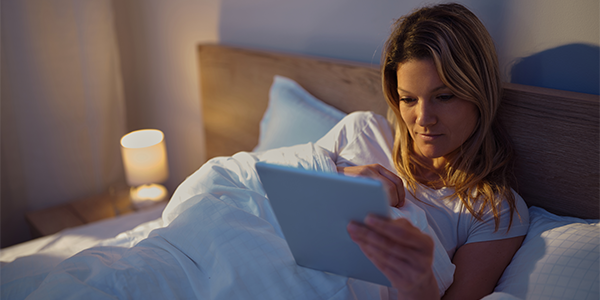In our 24/7 society, cell phones, computers and other electronic devices play a large part in how we work, play and keep in touch. According to the National Sleep Foundation, more than half of Americans regularly use an electronic device in the hour before they go to bed. But all that screen time may be harming our sleep.
Joanna Cooper, M.D., a neurologist and sleep medicine specialist with the Sutter East Bay Medical Foundation, says bright screens stimulate the part of our brain designed to keep us awake. Looking at a brightly lit screen prior to sleep can make for a restless night.
“The timing of sleep and wakefulness is controlled by two areas in the brain. One is highly sensitive to light and wakefulness. The other, called the pineal gland, secretes the sleep hormone melatonin when the light dims in the evening,” Dr. Cooper says.

Device screens produce blue light, Dr. Cooper says, which is the part of the light spectrum most active in our sleep cycle. Stimulation of this part of the brain suppresses production of melatonin, making it difficult for many people to “turn off” their brains and fall asleep.
“The light from our screens can delay our transition to sleep, even if we are engaged in some soothing activity online,” Dr. Cooper says. “But it’s more likely that our evening texting, television shows or video games are stimulating in themselves, keeping the brain busy and wound up, and even causing adrenaline rushes instead of calm.”
Not getting enough sleep or having poor sleep quality has been linked to other health problems such as heart disease, diabetes, high blood pressure, depression and obesity, Dr. Cooper says. Ongoing sleep deprivation can lead to excessive daytime sleepiness, a loss of the ability to concentrate and difficulty performing daily tasks. While no one wants these adverse side effects, it can be difficult to prioritize your health needs over sending that one last email.









